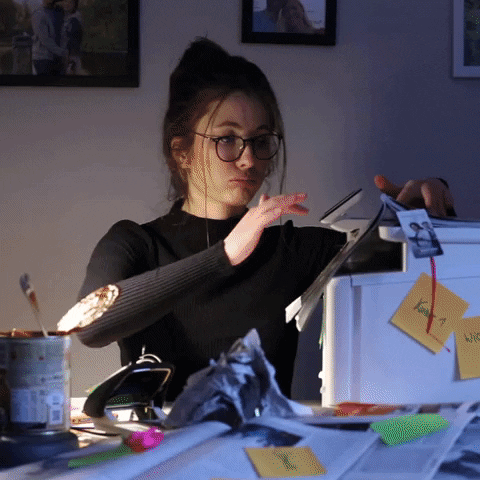The Greatest Misconception About Procrastination
It’s not about laziness or lack of time management skills
We all visualize what our weekends will look like after a hectic, stressful week.
I’ll have a bubble bath…
Declutter the closet…
Cook some healthy recipes…
Organize the kitchen…
Mow the lawn…
…and finally, dive into the book that’s been calling me for ages.
This weekend will be a super-productive one!
But, on Friday evening, reality strikes.
You reach home. You turn on the TV/computer to catch up on some news/listen to some tunes.
And before you know it, you’re on the ninth episode of ”Money Heist” with a popcorn bowl in hand and a box of ordered pizza.
The entire weekend plan just got flushed down the toilet.
This was my story. I am sure you can relate.
The study suggests up to 95 percent of people procrastinate due to only one reason.
And that is…
***Drumrolls***
The feeling of overwhelm.
Visualizing too many goals often curbs our mojo.
Why?
Science says human minds are wired for instant gratifications.
So, we always choose short-term rewards over long-term. Pleasure over productivity.
I realized this fact after consistently failing to keep up with my goals.
An eye-opening article on Procrastination published in Forbes says:
Procrastination is not just a matter of laziness or time management but rather a way of coping with negative emotions such as anxiety, guilt, shame, or low self-esteem.
So, overwhelm:
Creates an excessive fear of failure that most of us succumb to it and procrastinate
Paralyzes us in our comfort zone
Forces us to seek comfort over progress
Prompts us to revert to the state of easiness — devoid of negative emotions
From my experience, I have noticed that procrastination is mostly followed by only two kinds of overwhelming situations.
Situation#1: The Tsunami of Rapid-Fire Responsibilities
I had someone coming over with half an hour's notice. I had reached home from work, had clutter to clean, dishes to wash, prepare food, etc.
The series of events were too fast to process.
I froze for a few minutes, not knowing what to do and what not.
My brain was screaming to ask them to postpone their arrival. I even mentally cursed them for their emergency landing.
Since I had no choice but to make arrangements, I did what I could within my capacity.
Called my neighbor for help.
Ordered food online.
And…
I survived.
Most of us go through similar situations where everything happens too fast to understand and act.
And we expect ourselves to win the situation without considering our capacity.
Result?
The influx of overambitious goals freezes our actions.
Reason?
A Harvard study says:
“Our minds and bodies are not wired for uncertainty.
They are not often ready for the combination of intensity and impactful happenings.”
And what do we do in response?
We procrastinate.
But it’s NOT an intentional delay.
Experts suggest that:
It’s our mind and body attempting to restore a sense of calm. Faced with the chaos of sudden change, we naturally lean towards comfort and familiarity — the path of least resistance.
We’re not deliberately putting off our responsibilities; we’re simply choosing the less stressful route in the face of adversity.
In a nutshell, we don’t deliberately procrastinate our tasks; we just choose pleasure over suffering.
Situation#2: “The Snowball Effect”
I decided to spend an entire Sunday afternoon on the couch with a steaming cup of coffee and an unread book. I noticed a few dishes left in the sink from breakfast but thought, “I’ll handle it later.”
A few hours passed. More dishes joined the pile. By evening, the sight of the now teetering mountain of dirty dishes, coupled with the laundry I neglected to fold, made my heart sink.
This common scenario shows a bigger issue we face in life — the phenomenon of overwhelm.
Imagine a tiny snowball, which at first doesn’t seem dangerous, rolling down a hill (which is like our list of things to do), getting bigger and faster.
Soon, it becomes a huge snow slide that buries us under tons of tasks we delay and worry about.
My experience of the dishes and laundry isn’t an epic tale of grueling tasks.
Each chore, in reality, is a quick task that could be handled in ten or fifteen minutes.
But as people often say, it’s not always the biggest things that cause trouble. Even a small straw can be too much if the load is already heavy.
In this scenario, too, procrastination isn’t a bad habit — it’s like a signal or a red flag our mind and body send when we’re feeling too stressed.
An Important Realization
Whether it’s the “tsunami” of rapid-fire responsibilities or the snowball effect, both situations underscore the same vital principle: overwhelm and procrastination are interconnected.
“Overwhelm is not solely the product of an enormous workload, but also a result of multiple unattended tasks.”
In both scenarios, our bodies and minds react by initiating procrastination, not out of laziness, but as an automatic response to restore calm and alleviate stress.
As noted by Dr. Fuschia Sirois in her research paper published in the American Psychological Association:
Procrastination is a form of self-regulation failure characterized by the unnecessary delay of tasks despite knowing that this delay might lead to negative outcomes.
It’s not that individuals are intentionally putting off tasks, but rather, they’re seeking immediate mood repair.
Another study published in the Association for Psychological Science also attests:
“Procrastination is strongly linked with having a high level of stress and a low sense of well-being.”
This further underpins my scenarios where I procrastinated in response to overwhelming situations, reinforcing the idea that overwhelms leads to procrastination and stress, which can ultimately impact well-being.
Procrastination is the illusion of survival mode!
Here’s what I regularly do to keep procrastination at bay by dealing with overwhelm.
Ask Yourself a Simple Question
Mel Robbins’ “5 seconds Rule” gave me an idea:
“Can I do this job in just fifteen minutes?”
If the answer was yes, I’d start right away.
If the answer was no, I would take a break, but I found out those breaks were not needed that often.
For example, I had to wash my car. I had been putting it off for weeks, and it had gotten so dirty that even the rain couldn’t clean it.
I thought washing the car would be a really hard job.
But when I asked myself the question, I found out that the washing part would only take about fifteen minutes.
So, I took a deep breath, got the hose, and in fifteen minutes, my car was shiny and clean.
I felt happy and proud that I had done the job.
This self-interrogation helped me:
Cut through the exaggeration
Prioritize what’s important
Take action
The wisdom in this practice is apparent — rather than allowing procrastination to steal our time, we can reclaim control, task by manageable task.
Adopt a Rule of “Three”
‘Thinking real’ might sound like a cryptic mantra, but it’s quite simple.
It means acknowledging our capacity and aligning it with our daily tasks.
I’ve found the magic number to be three. I focus only on three manageable tasks each day, like ironing a pair of clothes, organizing one kitchen shelf, and vacuuming a single room.
You might wonder why three. Why not one, two, or even four?
The number ‘three’ struck the perfect balance for me.
A lower number might feel insufficient, fueling a sense of incompetence. On the contrary, anything more risks triggering overwhelm, falling into the trap of overthinking we aim to avoid.
The trick lies not just in deciding the tasks but also in visualizing and planning them.
The reason is this process can quickly become a labyrinth of excessive details, prompting overthinking and causing a paradoxical standstill.
So, how do you strike a balance?
Adopting a bird’s-eye view approach, focusing on the larger picture rather than micro details, has been my savior.
So, the next time you find yourself staring at a mountain of tasks, remember — think real. Keep it simple. Keep it ‘three.’”
Chop, chop, chop!
Tasks don’t overwhelm us; their stature does. If we can’t increase our motivation/commitment levels, we must break the task into doable chunks.
Writing relaxed me, but when I made it my profession, it often overwhelmed me after a while. So, I chopped it down into:
Ideation (30 minutes)
Research (60 minutes)
Drafting (45 minutes)
Editing and formatting (90 minutes)
The best part of breaking down the task is to visualize the commitment required and how much time you actually need to complete the job.
Break down the task before it breaks you down.
A Mental Replacement
Overwhelm is mostly associated with the feeling of doing it right, which gives rise to procrastination.
Instead of allowing your “obsessive attention to detail” to consume all of your time and mojo, be clear about the objective of your activities and establish a time limit to complete the task. This will motivate you to stay focused and complete your work on time.
Suppose you’re going to write a report. Be sure you know what you’re going to write about first.
If the report aims to convey data changes over the last few months, don’t worry about writing many delicate words. Instead, concentrate on the numbers and charts.
Focus on completion. Deal with making it flawless later.
Change The Crisis-Driven Mindset
Are you the ones who get excited by deadlines?
Do you find yourself performing best working under pressure?
Do you deliberately push tasks to be done at the last hour?
If yes, you might be managing your time poorly. These artificial “performance stimuli” are only baits. An illusion. They’re just an excuse for instant gratification.
It leaves you no time for reviewing the quality of your work with this type of procrastination. So, always deal with any tasks with the question mentioned above.
Closing Thoughts
Overwhelm is an irrational fear, frustration, self-doubt, and anxiety. It forces you to procrastinate because you want pleasure over suffering.
Procrastination is just a weak mindset. This is exactly why tweaking your mindset toward work can help you get the work done. It’s not always about laziness or time management skills.
We think procrastination is the survival mode, but it isn’t, as Christopher Parker quotes:
“Procrastination is like a credit card: it’s a lot of fun until you get the bill.”
Thanks for reading "Awesome Human Beings" and joining my mission to celebrate amazing people like YOU! 🎉
I hope to inspire you to grow and embrace life with my newsletter. 🌟
Want to support me?
Consider becoming a paying member!
If you loved what you read, please:
🔗 Follow me on Twitter, Medium, and LinkedIn (Clickable Links).
💌 Share my newsletter with friends and family on social media.
📣 Tell me your thoughts on today's letter!
Together, we can create a positive, uplifting world. 🌍
Love and respect, ❤️
Darshak Rana
Missed my last newsletter on “3 Bad Habits That Are "Actually" GOOD For You“?
Grab it here:






